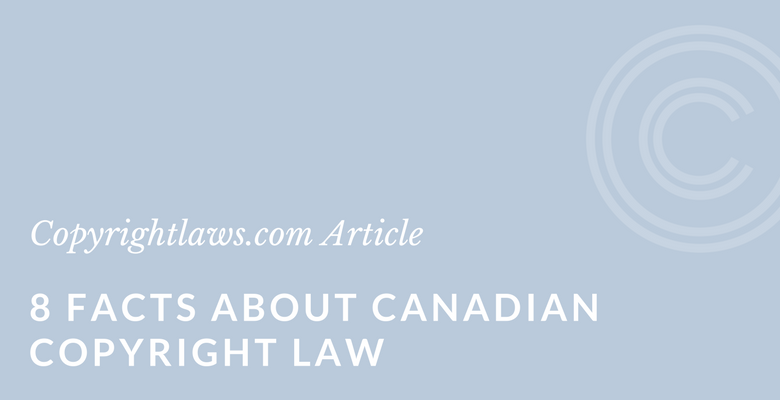

Eight important facts about Canadian copyright law are set out below.
How did we select only eight facts about Canadian copyright law when there's so much information available? We selected some unique things about Canadian copyright law, some international facts and some basic facts that Canadians and others should know about copyright law in Canada.
It's not mandatory to use a copyright symbol — © — in order to have copyright protection in Canada. Protection is automatic upon a work being “fixed” (e.g., a poem written on paper or a document saved on a hard drive).
If you're creating music in a band, that music is protected once you notate it or record it. If you're giving a speech or lecture, that speech or lecture is protected if written down or once it's recorded.
The duration of copyright protection in Canada is life-plus-seventy, or the end of the calendar year seventy years after the year in which the author died. Copyright expires on 31 December of that year. Note that this is the general duration of copyright in Canada and there are exceptions in specific circumstances. For further information, see Duration of Copyright Protection in Canada.
The previous duration of copyright protection in Canada was life-plus-fifty. On 30 September 2018, Canada, Mexico and the United States announced the completion of negotiations towards a new trade agreement to replace the North American Free Trade Agreement (NAFTA). The United States-Mexico-Canada Agreement (USMCA) includes a chapter on intellectual property. Under the USMCA, member countries are required to protect copyright for a minimum of 70 years after an author’s death. Life-plus-seventy is already the duration of copyright protection in the U.S.
Beginning 30 December 2022, copyright duration in Canada was extended to life-plus-seventy. It is important to note that any works which entered the public domain after the original life-plus-fifty duration before 30 December 2022 remain in the public domain.
Deposit of a work with the Canadian Copyright Office is not possible; any copy of a work sent to the Canadian Copyright Office will be sent back to the applicant, without any examination of the work or verification of its relation to the application it was sent with. You can, however, register your copyright works with the Canadian Copyright Office by completing the copyright registration application.
Canadians who plan to commercially distribute their copyright works generally use the Canadian Copyright Office registration system. Often, they also register in the U.S. Copyright Office where a copy of the work is mandatory, providing extra proof should the copyright owner need to pursue their rights.
In addition to economic rights, the Canadian Copyright Act provides authors with three kinds of moral rights, rights that protect the author of a work.
Not all countries provide moral rights and each country that does may have unique moral rights in its copyright law.
There's no fair use provision in the Canadian Copyright Act. There is a fair dealing provision for specific purposes:
* The purposes of parody and education were added as part of the 2012 amendments to the Canadian Copyright Act.
If the use falls within one of these purposes, then you must determine fairness by applying your facts to the following factors set out in a Supreme Court of Canada case:
The Canadian Copyright Act allows an individual to use copyright protected materials when creating a new work such as a mash-up, and to post the new work online on a site like YouTube. This is a unique provision added to the Canadian Copyright Act in 2012.
If you have copyright protection in Canada, you have automatic protection in the close to 200 countries that belong to the Berne Copyright Convention. Canadian works are protected in those countries according to the copyright laws of those countries.
Similarly, works from any of the other Berne member countries are protected in Canada under the Canadian Copyright Act (also see below).
When reproducing content while physically in Canada, even content from another country, you apply Canadian copyright law. Thus in Canada, you can apply fair dealing to the use of your works whereas the same use of the same works may fall under the U.S. doctrine of fair use when reproduced in the U.S.
Need to learn more about Canadian copyright law? Read about the only copyright certificate program in Canada, the Certificate in Canadian Copyright Law. Designed for
Copyright Officers, Copyright Librarians and other nonlawyers
who deal with copyright issues on a daily basis.